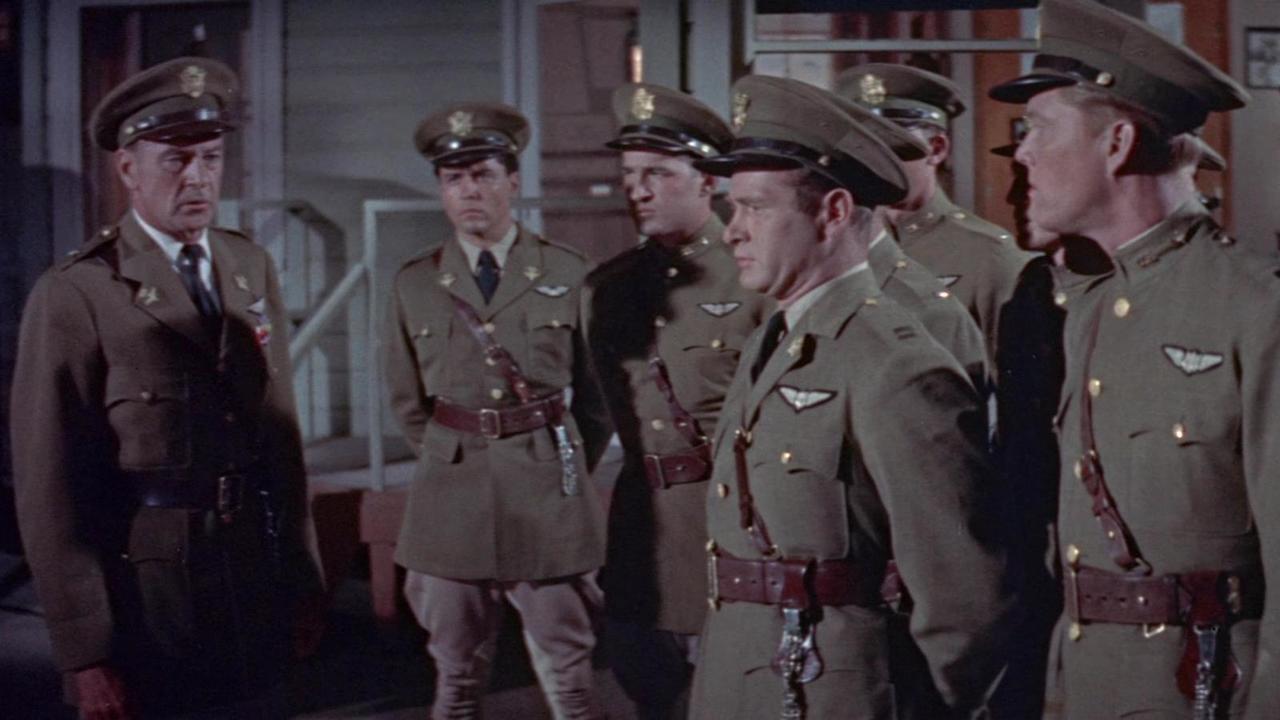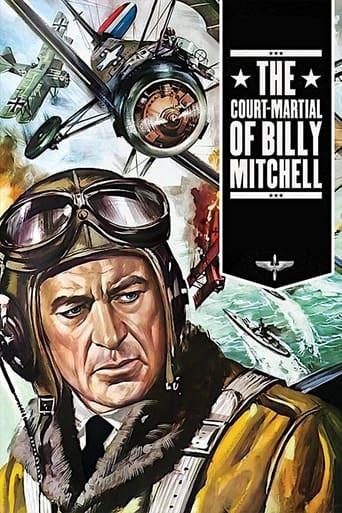

It was known as ONE MAN MUTINY in the U.K. since Billy Mitchell's was not a name to conjure with over here. (Warners had a similar problem with the Alan Ladd vehicle THE McCONNELL STORY which wound up as TIGER IN THE SKY). I'd never heard of Mitchell either before this but had connection at the time with the world of military protocol and what happened when you broke the rules, if only as a humble National Serviceman. A courtroom drama was always a draw, here allied with a recreation of the Twenties in the new CinemaScope and a score by Dimitri Tiomkin which appropriately stiffened the sinews and summoned up the blood. Gary Cooper cut an impressive figure in his uniform and though I now learn that he wasn't everybody's choice for the part his HIGH NOON image - the lone man of integrity at odds with his own community - probably made him more sympathetic.War-hero Mitchell was tried for insubordination after speaking out of turn to the press about the Army's indifferent attitude to his beloved Air Service - underfunded and undervalued, losing fliers in clapped-out planes (on peacetime exercises and duties) and unconvinced by Mitchell's vision of the future role and importance of aerial combat. Found guilty, which technically he was, he was suspended for five years without pay but later chose to resign (not shown in the film). History was to thoroughly vindicate his stance and the man himself posthumously recognised and honoured (not shown either) but it still seems pretty courageous, in the politically-touchy Fifties, to mount a production in which the military establishment is the 'heavy'. All grist to the mill, however, for Otto Preminger who delighted in giving the censors sleepless nights though Mitchell's attack is somewhat softened. "You want to give the Army a kick in the pants but you want to do it like a gentleman," his counsel wryly observes. In reality the in-fighting was a good deal more abrasive but Coop, true to his movie-code, never sneaks a low blow.Charles Bickford, in his third and final film for Preminger, heads up the support as Mitchell's austere C.O. who becomes an implacable opponent. Twenty years earlier he was the villain Latigo to Coop's Bill Hickok in THE PLAINSMAN. Ralph Bellamy, for so long the squarejohn who never got the girl in Thirties comedies, bounced back on the screen after ten years away treading the boards with a zesty turn as Billy's attorney whose achieving of a deal with the court is scuppered when his client resolutely refuses to compromise. The young Rod Steiger, back in the days when he was prone to show his teeth and sneer at the camera, gives one of his more modulated performances as the prosecution's hired gun, possibly overawed by Preminger (an even bigger ham on set). I like the way he introduces himself by rapping on the table, as if respectfully knocking at the door before moving in to nail his prey, even sharing a joke with the defendant during their pertinent exchanges. In the film Mitchell is given a bout of malaria to also contend with during the trial. Whether this was authentic or a device to help bolster Coop against the new boy's darting swoops and tricks is interesting to consider. All this is taking place, of course, during Prohibition - which explains why Billy is only offered a glass of milk when he visits the Landsdownes' apartment. Preminger respects his audience sufficiently not to elaborate here though Billy tactfully doesn't drink it. We're left to wonder whether young clean-cut Commander Zack might have a covert bottle or two stashed away. Maybe even Crazy Otto couldn't go that far...
... View MoreThis is a decent film, for the most part a very watchable telling of a good true story which is worth knowing about. Gary Cooper is solid in the title role (albeit he is apparently nothing like the real-life Mitchell) and the drama moves along at a reasonable pace.But for 17 minutes towards the end it rises above that and becomes mesmerising. What makes the difference? Two words: Rod Steiger. The cross-examination scene, where he goads and scorns Cooper mercilessly, is one of those very rare moments in cinema when a performance holds the screen and burns itself into your memory. No matter how many times I have seen this film, I always spend the first hour or so waiting to relish this particular scene. And I am never disappointed.So watch the film for two reasons: it is good in its own right. A well-played, thoughtful and dignified film about a good man who was ahead of his time. But whatever you do, make sure you don't miss the last half-hour!
... View More1st of all ...you need to realize what exactly sank the greatest battleship that ever so briefly sailed the sea was the German Bismark sunk a year before the attack on Pearl Harbor even happened --- they were WWI biplane torpedo dive bomber in a last ditch desperation attack flying off an English carrier by disabling the battleship's rudder control thereby demonstrating the point that Gen Mithchell was trying to make ! Next ...I saw Billy Mitchell in a mid 30's news reel - pretty much in the Chuck Yaeger - Gary Cooper style - if I remember correctly - sitting back in khakis - cane at his side - " What I've been fired for - predicting the aviation dynamics of the next war - the devastation of - civilian targets - cities - the enemy nations industrial capacity to fight wars - WHEN THE NEXT WAR STARTS THE HEADS ARE GOING TO ROLL - what I have gone through will be nothing in comparison ! " What the movie got right so dramatically ... a poetic Hollywood license --- was when citizen Mitchell walked out from his court martial trial there was a propeller biplane fly - bye which turned into the Air Force JET Thunderbirds that the movie ended on ! My thoughts on all this is America will be secretly attacked again and again - unprepared - coward into protracted generational conflicts due to the public's unwillingness to see the problem - get the job done ! Clock punchers - pencil pushers - paper shufflers - war criminals - incompetents ! Thank God for men like Billy Mitchell !
... View MoreI have always found this picture fascinating, perhaps, unwittingly, almost a milestone. The other contributors on this page have got quite worked up about the historical context and accuracy of the movie. What they have to say is very interesting and I am sure very valid. I confess I was content to enjoy the film as an involving, and at times quite compelling, drama.What has always interested me however about this movie is the acting. And the real sense of, in this one film, the baton as it were, being passed.For about the first three quarters of the movie the acting is exactly as one would expect from almost any "stiff upper lip" Hollywood military drama of the time. Dear old Gary Cooper (getting a bit long in the tooth) hitting his one note and doing it very well. And a few old stalwarts like Ralph Bellamy dutifully plowing the same furrow. And even the younger actors content to mimic the same stodgy expository style of their elders.And then...in comes Steiger. Fluid, fluent, naturalistic, delivering his lines twice as fast as everyone else. In short a real character, as opposed to a cut-out, hits the screen.I guess what you could call it is new acting mets the old. Now by the time this movie had come out, "The Method" had already had lots of screen time...Clift, Brando, Shelley Winters, Steiger himself. But they were in their own movies. Well perhaps "Red River" might be another example (Wayne and Clift); but this movie is the best example of all.When I saw the movie I knew nothing of the actual events portrayed, and I suppose, as I was watching it, I assumed that we would plod through in a totally acceptable way to Mitchell's certain triumph. And then wham! Rod blows the whole film out of the water.In the actual story Mitchell was "beaten" by Gullion (and historians I know that statement is a travesty...but allow me my soundbite point.) In the movie Cooper is knocked cold by Steiger.
... View More